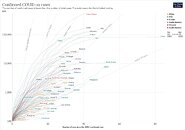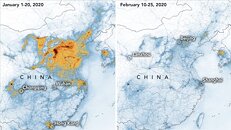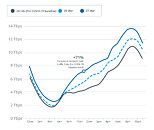Raevenlord
News Editor
- Joined
- Aug 12, 2016
- Messages
- 3,755 (1.18/day)
- Location
- Portugal
| System Name | The Ryzening |
|---|---|
| Processor | AMD Ryzen 9 5900X |
| Motherboard | MSI X570 MAG TOMAHAWK |
| Cooling | Lian Li Galahad 360mm AIO |
| Memory | 32 GB G.Skill Trident Z F4-3733 (4x 8 GB) |
| Video Card(s) | Gigabyte RTX 3070 Ti |
| Storage | Boot: Transcend MTE220S 2TB, Kintson A2000 1TB, Seagate Firewolf Pro 14 TB |
| Display(s) | Acer Nitro VG270UP (1440p 144 Hz IPS) |
| Case | Lian Li O11DX Dynamic White |
| Audio Device(s) | iFi Audio Zen DAC |
| Power Supply | Seasonic Focus+ 750 W |
| Mouse | Cooler Master Masterkeys Lite L |
| Keyboard | Cooler Master Masterkeys Lite L |
| Software | Windows 10 x64 |
I had to take that sentence from Game of Thrones' Little Finger (if you recognized it, kudos to you), since I believe it to be mostly true, given we have the right mindset about that which surrounds us. While the pandemic will always be a mainly bleak point in humanity's history, and everyday there are reports of people being their worst selves through these difficult times, there is also always opportunity for growth affixed to any great crisis. It falls upon us, our institutions, and on companies, to see really what we can learn from situations such as these.
For one, we've seen, beyond any possible ideological beliefs we may have, that the Internet is a utility, not a commodity. Its capability to bridge the gaps in geography - and in social connection - is just too important in our globalized society to be considered anything other than a fundamental right. Discussions on this point have been ongoing for a while, and debates surrounding things like the net neutrality have already given birth to rivers of both actual and digital ink. However, it is this writer's opinion that the discussion is moot, and nothing more than a speedbump until we achieve the final, inescapable truth that the Internet is a crucial part of the world's infrastructure, and not only that - of what it means to be human in our modern world.


The pandemic is an opportunity for our institutions to learn and harden; to understand exactly what kind of responses are required, and how hard the measures have to be to contain a threat to our modern society. While some lessons won't be carried forward, I believe that many of them will, and they will be there for us should we actually need to resort to a similar response to a future crisis. This global health crisis could be an opportunity for citizens to look to their healthcare system and understand whether or not that is the type of system they want to support and to be under the umbrella of.

The pandemic is an opportunity for the world to hit a reset button for a while when it comes to the scale of pollution and resource depletion we've subjected it. Resource and ecosystem recovery from our continued pressure will take years to materialize - and won't do so at the expense of this relative blip of a pandemic. But other, more volatile signs, such as pollution, have shown tremendous improvement due to the reduced need for traffic, as governments and businesses around the world adopt teleworking as a measure to keep operating, at some level, whilst protecting their employees. Just take a look at the pollution maps on the East Coast of the United States and China: there is no scale other than the colorimetric one, but that does show us something, doesn't it? Teleworking could be the evolution that actually impacts pollution levels the most - nevermind the mainstream availability of electric cars.


Teleworking also gives us - but especially businesses - an opportunity to abandon the need for micromanaging their employees. It has been shown, time and again, that micromanagement strategies don't work in the office. In fact, a study led by the Stanford University found some surprising trends (to skeptics) in teleworking compared to traditional work. Telecommuters were found to work the equivalent to "a full day of work", and sometimes even more. People actually worked true full shifts (they didn't arrive late or leave early, and found it less distracting to work from home). Additionally (and incredibly), employee attrition decreased by 50 percent among the telecommuters, they took shorter breaks, had fewer sick days, and took less time off.


Think about it. This means that employees were actually more productive in a teleworking environment than in the usual work environment. And it makes sense to all but the most short-minded people. No need to wake up early to drive, walk or otherwise commute a daily nightmare through traffic or public transportation, clogging the roads with polluting cars or other means of transportation. Less hours required in commuting means more hours virtually available for work. Less hours commuting also means more time at home, with their families. More meals at home, more time at home, means that people can actually learn to live as a family again, sharing meals and spending more time together than they have until now. Lesser stress levels, an increased chance for family interaction, higher productivity, lesser pollution levels, and reduced company costs in actually renting or buying floor space for their offices. What is there not to like?

The pandemic is also an opportunity for the world of tech, as strange as it may seem: it's an opportunity for improving and investing in the infrastructure of the World Wide Web. As usage patterns change and the load in the optical information highways connecting the world increases, businesses (from ISPs to data center providers) have had to increase their infrastructure investment or have adopted consumer-friendly policies, such as reducing data caps- Should the internet be any less flexible (let's say, like the healthcare or public transportation), the usage strain increase would have thrown us back into the dark ages. Instead, we saw an increase in volume of data (especially in the video category, which is responsible for some 50% to 60% of the overall Internet bandwidth usage).

According to Vodafone, the pandemic has changed our usage habits: traffic in Spain and Italy, for example, two of the most heavily-affected countries in Europe, saw increases in the order of 50%, with peak hours also changing - from the back-from-work 6pm - 8pm to a lunch-time 12pm. Providers of streaming services reduced the quality of their transmissions to allow the internet highway to work seamlessly, accommodating increased usage from video-conferencing apps and overall communication increase amongst both people and businesses. In the last few weeks, some services saw usage ratios equivalent to that of an entire year of data flowing through their servers - and despite some outages here and there, the Internet held strong. But new investments are being made, building up the Internet as an organ capable of digesting even the more voluminous assaults on its integrity - and in the end, it will rise up stronger than ever before.
If chaos isn't a ladder, it could at least be viewed as an opportunity. And this pandemic is an opportunity for all of the above, but also for us to practice being a community, being humanity. This means not taking more than we actually need; it means taking this extra time for ourselves to look into our lives and into ourselves as humans, into our position in life and our position with our loved ones. It means we now have a rare moment of peace and quiet where we can actually hear our own thoughts, instead of the usual, unbreakable rhythm of the modern society, always craving more of our attention, more of our time, more of ourselves - assaulting us with social media, neon-like ads, traffic noises, office tensions, and a myriad other elements that all fight for our energy.
View at TechPowerUp Main Site
For one, we've seen, beyond any possible ideological beliefs we may have, that the Internet is a utility, not a commodity. Its capability to bridge the gaps in geography - and in social connection - is just too important in our globalized society to be considered anything other than a fundamental right. Discussions on this point have been ongoing for a while, and debates surrounding things like the net neutrality have already given birth to rivers of both actual and digital ink. However, it is this writer's opinion that the discussion is moot, and nothing more than a speedbump until we achieve the final, inescapable truth that the Internet is a crucial part of the world's infrastructure, and not only that - of what it means to be human in our modern world.


The pandemic is an opportunity for our institutions to learn and harden; to understand exactly what kind of responses are required, and how hard the measures have to be to contain a threat to our modern society. While some lessons won't be carried forward, I believe that many of them will, and they will be there for us should we actually need to resort to a similar response to a future crisis. This global health crisis could be an opportunity for citizens to look to their healthcare system and understand whether or not that is the type of system they want to support and to be under the umbrella of.

The pandemic is an opportunity for the world to hit a reset button for a while when it comes to the scale of pollution and resource depletion we've subjected it. Resource and ecosystem recovery from our continued pressure will take years to materialize - and won't do so at the expense of this relative blip of a pandemic. But other, more volatile signs, such as pollution, have shown tremendous improvement due to the reduced need for traffic, as governments and businesses around the world adopt teleworking as a measure to keep operating, at some level, whilst protecting their employees. Just take a look at the pollution maps on the East Coast of the United States and China: there is no scale other than the colorimetric one, but that does show us something, doesn't it? Teleworking could be the evolution that actually impacts pollution levels the most - nevermind the mainstream availability of electric cars.


Teleworking also gives us - but especially businesses - an opportunity to abandon the need for micromanaging their employees. It has been shown, time and again, that micromanagement strategies don't work in the office. In fact, a study led by the Stanford University found some surprising trends (to skeptics) in teleworking compared to traditional work. Telecommuters were found to work the equivalent to "a full day of work", and sometimes even more. People actually worked true full shifts (they didn't arrive late or leave early, and found it less distracting to work from home). Additionally (and incredibly), employee attrition decreased by 50 percent among the telecommuters, they took shorter breaks, had fewer sick days, and took less time off.


Think about it. This means that employees were actually more productive in a teleworking environment than in the usual work environment. And it makes sense to all but the most short-minded people. No need to wake up early to drive, walk or otherwise commute a daily nightmare through traffic or public transportation, clogging the roads with polluting cars or other means of transportation. Less hours required in commuting means more hours virtually available for work. Less hours commuting also means more time at home, with their families. More meals at home, more time at home, means that people can actually learn to live as a family again, sharing meals and spending more time together than they have until now. Lesser stress levels, an increased chance for family interaction, higher productivity, lesser pollution levels, and reduced company costs in actually renting or buying floor space for their offices. What is there not to like?

The pandemic is also an opportunity for the world of tech, as strange as it may seem: it's an opportunity for improving and investing in the infrastructure of the World Wide Web. As usage patterns change and the load in the optical information highways connecting the world increases, businesses (from ISPs to data center providers) have had to increase their infrastructure investment or have adopted consumer-friendly policies, such as reducing data caps- Should the internet be any less flexible (let's say, like the healthcare or public transportation), the usage strain increase would have thrown us back into the dark ages. Instead, we saw an increase in volume of data (especially in the video category, which is responsible for some 50% to 60% of the overall Internet bandwidth usage).

According to Vodafone, the pandemic has changed our usage habits: traffic in Spain and Italy, for example, two of the most heavily-affected countries in Europe, saw increases in the order of 50%, with peak hours also changing - from the back-from-work 6pm - 8pm to a lunch-time 12pm. Providers of streaming services reduced the quality of their transmissions to allow the internet highway to work seamlessly, accommodating increased usage from video-conferencing apps and overall communication increase amongst both people and businesses. In the last few weeks, some services saw usage ratios equivalent to that of an entire year of data flowing through their servers - and despite some outages here and there, the Internet held strong. But new investments are being made, building up the Internet as an organ capable of digesting even the more voluminous assaults on its integrity - and in the end, it will rise up stronger than ever before.
If chaos isn't a ladder, it could at least be viewed as an opportunity. And this pandemic is an opportunity for all of the above, but also for us to practice being a community, being humanity. This means not taking more than we actually need; it means taking this extra time for ourselves to look into our lives and into ourselves as humans, into our position in life and our position with our loved ones. It means we now have a rare moment of peace and quiet where we can actually hear our own thoughts, instead of the usual, unbreakable rhythm of the modern society, always craving more of our attention, more of our time, more of ourselves - assaulting us with social media, neon-like ads, traffic noises, office tensions, and a myriad other elements that all fight for our energy.
View at TechPowerUp Main Site





